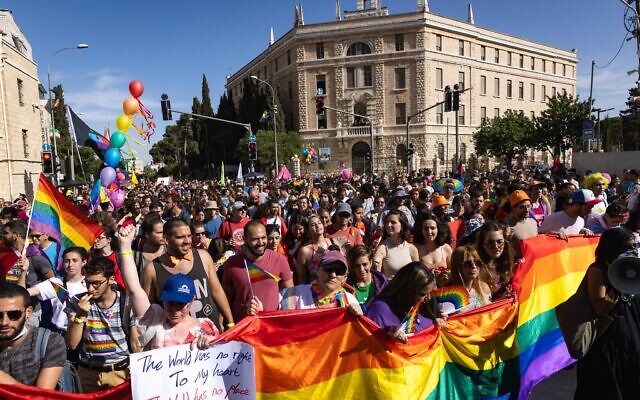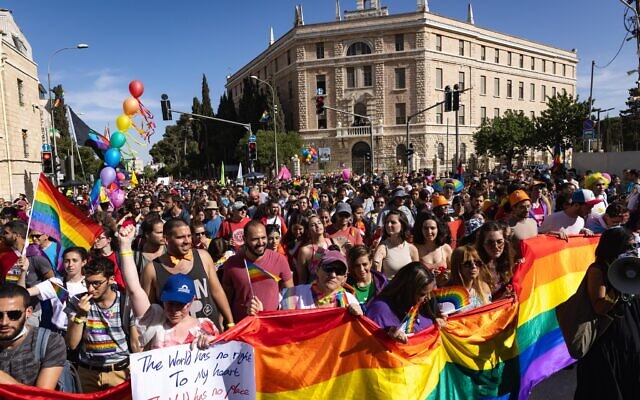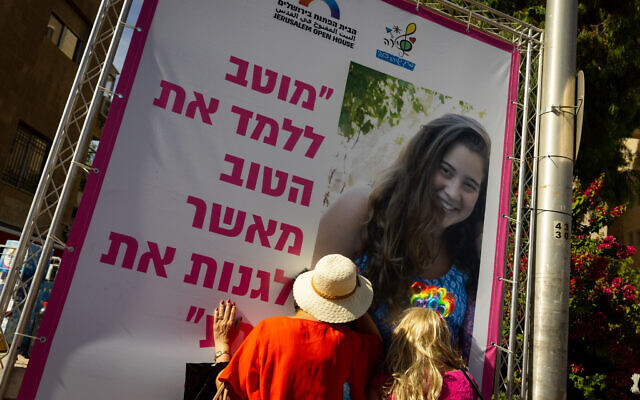
Chanting for equality and holding aloft brightly painted signs supporting LGBT rights, some 7,500 people marched in Jerusalem’s annual pride parade Thursday evening.
Over 3,000 police officers secured the highly charged event, six years after a deadly attack on participants.
The event demanding LGBT equality began with a ceremonial prayer for Shira Banki, who was stabbed to death by an ultra-Orthodox extremist during the 2015 parade when she was 16 years old.
Many streets in the capital’s city center were closed and the thousands of police officers on duty secured the parade’s route.

Thousands of people take part in the annual Gay Pride Parade in Jerusalem, June 3, 2021. (Olivier Fitoussi/ Flash90)
The 2.5-kilometer (1.55 miles) march, from the city’s Liberty Bell Park to Independence Park, began at 2:30 p.m., signaling the start of pride month events in Israel.
The annual event is a highlight for the city’s vibrant LGBT community, which is often overshadowed by Tel Aviv’s gay-friendly persona and beset by religious and political tensions ever-present in the capital.
The parade did not go ahead last year due to the COVID-19 pandemic, and even this year, organizers canceled a mass event at Independence Park that usually concludes the event.
As thousands filled the capital’s streets, a small demonstration protesting the parade was held by members of the far-right and anti-gay Lehava organization.

Right wing activists demonstrate against the annual Gay Pride parade in Jerusalem, on June 3, 2021. (Noam Revkin Fenton/Flash90)
Amid the security preparations, two 17-year-olds were detained on suspicion of hanging signs against the parade, police said, adding that dozens of additional signs were found in the teens’ possession. No details were given on their content.
On Wednesday police arrested a Jerusalem resident after he threatened to kill participants at the event. The Jerusalem Magistrate’s Court extended the suspect’s remand until Friday. The suspect is reportedly known to police and has been arrested in the past for making threats. Police suspect he has mental health issues, Channel 12 news reported, adding that the court ordered him sent for an examination.
In 2015, Shira Banki was stabbed to death during the parade, and several others were injured by an ultra-Orthodox man who had been released from prison just a few weeks earlier, after serving time for attacking a previous parade.
Along the route, marchers stopped to lay flowers at the spot on Keren Hayesod Street where Banki was stabbed.

People at the Gay Pride Parade in Jerusalem on June 3, 2021, look at a photo of Shira Banki, murdered by an ultra-Orthodox extremist at the march in 2015. (Olivier Fitoussi/Flash90)
The parade came as rights activists have raised concerns about anti-LGBT lawmakers in the Knesset, as well as in the potential coalition.
Upon sealing a deal to enter the next coalition, the head of the Islamist Ra’am party Mansour Abbas on Thursday vowed to oppose any moves to bolster LGBT rights, after Meretz party head Nitzan Horowitz said that same-sex marriage was part of the coalition deal.
Additionally, the far-right Religious Zionism party, which now controls six seats in the Knesset, has three members openly hostile to LGBT rights: Avi Maoz, leader of the Noam faction, and Itamar Ben Gvir and leader MK Bezalel Smotrich, organizers of the 2006 “beast march” in Jerusalem, in which religious opponents of the Pride March walked with donkeys.